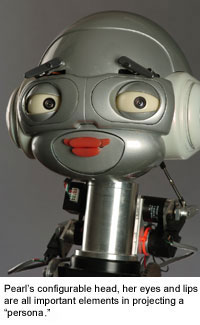Lynn S. sent us a link to a Carnegie Mellon story about a new robotic “nurse” for the elderly. Her name is “Pearl.”
It should go without saying that robots do not need to be gendered male or female and that, in this case, gendering the robot female reproduces a wasp’s nest of stereotypes about who is responsible for caring for others.
I say it should go without saying but, in fact, it mostly does, in the most bizarre way. The article is about trying to maximize Pearl’s effectiveness as a helper by testing various configurations of appearance, mannerisms, expressions, etc. But they never address why she is female. From the article:
To that end, a multidisciplinary team of roboticists, social scientists and interaction designers has drawn on theories of emotion from cognitive science and the principles of aesthetics to explore what happens when human characteristics are added—or taken away—from Pearl’s “persona.”
…
Appearance has a strong impact on a person’s expectations. Researchers want to learn whether facial characteristics will factor into the emotional reaction of people who interact with her. Pearl’s configurable head, the size and spacing of her eyes and the shape of her lips are all important elements in projecting a “persona.”
In the caption to this image, they mention the importance of her “configurable head” for her “persona,” but her gender remains conspicuously unexamined.
Only once in the entire article do they mention gender. They say that they are “…studying people’s responses to a robot’s perceived gender by changing Pearl’s lips and voice.” But they named her Pearl, so they seem to have rushed to a conclusion there. It’s as if, despite the incredible range of concerns and experimentation, scientists are not seriously questioning her sex.
And I think they should! Not only because it’s good science, and not only to avoid sexist assumptions, but because the robot is being designed for senior citizens, who are disproportionately women, most of whom have spent a lifetime caring for children and husbands; I’d bet they’d find a nursebot named Peter to be quite a treat!
Lisa Wade, PhD is an Associate Professor at Tulane University. She is the author of American Hookup, a book about college sexual culture; a textbook about gender; and a forthcoming introductory text: Terrible Magnificent Sociology. You can follow her on Twitter and Instagram.


Comments 34
Erica — February 7, 2010
I was going to say that in dealing with the elderly in care you're often confronting mild to severe dementia, and keeping things stereotypical actually helps them because of the familiarity. Dealing with things that are new can be confusing and frightening.
And then I realized I was talking about a Jetson's-esque robot administering health care. If the seniors can handle that, I suppose a male nurse isn't too much more of a leap!
KD — February 7, 2010
If their intent is to anthropomorphize the robot, giving it a gender seems unavoidable. People don't see genderlessness as a human quality. Plus, if they did not specify a gender, it would be male anyway, as that is the neutral default. Still, it's baffling that they would consider all of these other characteristics and spend no time talking about their decision to make it female.
TheophileEscargot — February 7, 2010
For more examples, you might find BotJunkie's "Medical" category interesting:
http://www.botjunkie.com/category/medical/
At a quick glance, four of them appear to be gender neutral (CareBot, Robovie, Bloodbot, Riba). There of them seem to be female (NANC-E, Autom, CiCi). Only one seems to be male, and that's the "personal trainer" bot Bandit.
nakedthoughts — February 7, 2010
Womanifying objects and objectifying women seem to be very similar and rooted in the same patriarchal ideals.
you can make an object into a woman, because a woman is used as an object anyway.
Jack — February 7, 2010
Could it not be that they didn't discuss the 'gender' of the robot as a tacit way of challenging the "default=male" assumption? If they had made the robot 'male' wouldn't you just be complaining about techno-stuff being assumed male and how its presumably mostly male creators keep making things in their own image?
Monday Monday « Natter — February 8, 2010
[...] New “Elder care” robat is, inexplicably, female-gendered. Who really needs a robot with a gender? That’s not really their function, right? Also, those lips are freaky. [...]
RN — February 9, 2010
Aside from the gender, is no one disturbed by the notion that not only are we sidelining our elders to old folks homes but now we are designing robots to care for them. No human contact at all? At least the poster of the blog had the good sense to put "nurse" in quotation marks as this thing is the least able to care for anyone of any age and even with the best technology a person put in the "care" of a machine has had their dignity robbed of them. ARgh. I'm so ticked at this "good science" I'm rambling...
References from both sides of the issue: http://www.nursingadvocacy.org/news/2006/oct/29_canadian.html
Hurf — February 9, 2010
"I’d bet they’d find a nursebot named Peter to be quite a treat!"
Nice stereotyping, champ
Basiorana — February 10, 2010
My fiance worked with elderly dementia patients before and found many of the women recoiled from him, because they had been abused by men in their younger years (or maybe even recently). Many had histories of spousal abuse or rapes and because they were unable to understand that he was not that man and was there to help, they only focused on his deeper voice. None of the men had any issue with the women, except one or two that were pretty coherent and wanted a male nurse to avoid embarrassment.
The most heartbreaking moment he had was when he was asked to lift an elderly woman who was blind and in severe dementia, and he gently spoke to her to warn her he was about to move her-- and she started screaming and wailing and crawling across the bed, but his boss forced him to move her anyway so they could get to her bedsores. That was the day he decided to quit.
Male voices in dementia wards can be a very bad idea. I would have started with a female baseline too.
CC — February 10, 2010
Masculine is always the default! Look at humanized robots anywhere, the only kind of ladybots out there are GIRLBOTS with bows or SEXBOTS with boobs, like there needs to be a special reason for making it a LADY ROBOT, instead of a male robot like would be the norm. Maybe it's a good thing that (it would seem) she's a chick for no reason. Not to mention she's hardly sexy.
Jeff Kaufman — February 10, 2010
I'm not sure masculine is the default for humanized robots that have actually been built. I just looked at the humanoid robots on wikipedia and found:
Male: HUBO, Archie, Jo-Zero, IsaacRobot, TOPIO
Appear androgynous: iCub, REEM, HOAP, MUSA, Kobian, Asimo, Nao, Plen, Qrio, SEROPI
Female: Kismet, Akio, Roxxxy (sex robot), EveR, HRP, Flame/Denise, Meinu, Pearl
Made in two gendered versions: Actroid, MAHRU/AHRA
Intentionally gender neutral: Cog, Coco
For Cog, for example, the FAQ on the cog site has:
Q: Is Cog a boy or a girl?
A: No. The robot has no gender, and we try to use the pronoun "it" whenever it comes up. We also carefully construct our sentences to avoid third person references.
Aside from Roxxxy, none of the gynoids have bows (girlbots) or exaggerated secondary sexual characteristics (sexbots). There are more robots that use the pronoun "she" than use "he", though there are more that use "it" than either.
Joey Diggs — February 12, 2010
All hardware is female. That is because as male creators we have a complicated relationship with the devices that we make. The robots, programs, engines and electronics we invent are personal to us, and are imbued by us with a full set of emotional traits. The devices are sometimes unresponsive, temperamental, broken, wondrous, powerful, surprising and stupendous... sounds like a female to me.
I'll tell you what - when you invent your own "Pearl" the Robot, you can give her any sex you want.